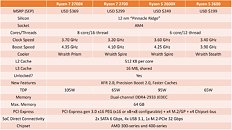Sunday, March 25th 2018

AMD Ryzen 7 "2800X" Not Part of First Wave
AMD is preparing to launch its first wave of 12 nm Ryzen 2000-series "Pinnacle Ridge" processors in April, with possible availability on the 19th. From all of the materials leaked to the web, it's becoming clear that the Ryzen 7 2700X will be the company's next flagship socket AM4 processor, with a "2800X" not being part of the first wave of "Pinnacle Ridge" chips. Adding further to the theory of the first wave of "Pinnacle Ridge" chips being led by the 2700X, is the leaked cover of the next issue of print magazine CanardPC, which screams "2700X," and includes a roundup of second-generation Ryzen parts from 2200G all the way through the 2700X. The 2700X, besides process and minor architectural refinements, also features higher clocks than the current company flagship in the segment, the Ryzen 7 1800X. It's clocked at 3.70 GHz base, with 4.35 GHz boost, and XFR 2.0 driving the clocks up even further, compared to the 3.60/4.00/4.20 GHz (base/boost/max-XFR) of the 1800X. For this reason alone, the 2700X will be a faster part.
AMD has the advantage of having sized up Intel's Core i7-8700K before deciding to lead with the 2700X. The possible 2800X will depend on Intel's short-term response to the 2700X. There were rumors late last year of a possible speed-bumped "Core i7-8720K." AMD's first wave of Ryzen 2000-series "Pinnacle Ridge" will be as brisk as Intel's first "Coffee Lake" desktop processors, with just four SKUs - the Ryzen 7 2700X, the Ryzen 7 2700, the Ryzen 5 2600X, and the Ryzen 5 2600. Besides higher clocks, the chips could feature a minor IPC uplift (vs. first-generation "Summit Ridge") thanks to rumored faster (lower-latency) caches, support for higher memory clocks, updated Precision Boost algorithms, and XFR 2.0.
AMD has the advantage of having sized up Intel's Core i7-8700K before deciding to lead with the 2700X. The possible 2800X will depend on Intel's short-term response to the 2700X. There were rumors late last year of a possible speed-bumped "Core i7-8720K." AMD's first wave of Ryzen 2000-series "Pinnacle Ridge" will be as brisk as Intel's first "Coffee Lake" desktop processors, with just four SKUs - the Ryzen 7 2700X, the Ryzen 7 2700, the Ryzen 5 2600X, and the Ryzen 5 2600. Besides higher clocks, the chips could feature a minor IPC uplift (vs. first-generation "Summit Ridge") thanks to rumored faster (lower-latency) caches, support for higher memory clocks, updated Precision Boost algorithms, and XFR 2.0.


71 Comments on AMD Ryzen 7 "2800X" Not Part of First Wave
P.S.
Do CPUs ever really get QR codes anyway?
en.wikipedia.org/wiki/Data_Matrix
I ran amd since amd286, I so want an excuse to go back.....
That is quite significant and kinda kills any dreams of a higher clocked version popping up soon. These TDP bumps clearly indicate they're pushing Ryzen beyond its comfort zone, just like Intel's CFL is right now.
Top 5% of chips go to TR or or something? A TR 2950X hitting 3.9+ base and a matching boost/XFR increase would certainly be interesting.
Then there is the question of how much production ends up in Epyc.
Also, should be noted for arguments sake, power draw stopped being a topic of merit when Radeon started using lots of power in their GPU and people said, "nobody cares about power draw".
Also, the fact they have refined things enough to actually get those clocks is the positive aspect. First gen Ryzens had a really hard time getting a guaranteed 4Ghz. If 2nd gen makes that a constant, then that is a good step, regardless of the 10w higher draw.
vanisheddiminished(i7 7700k vs R7 1800x).However, boost speeds are of secondary importance to the average user, because there's no specification how and for how long you can benefit from them.